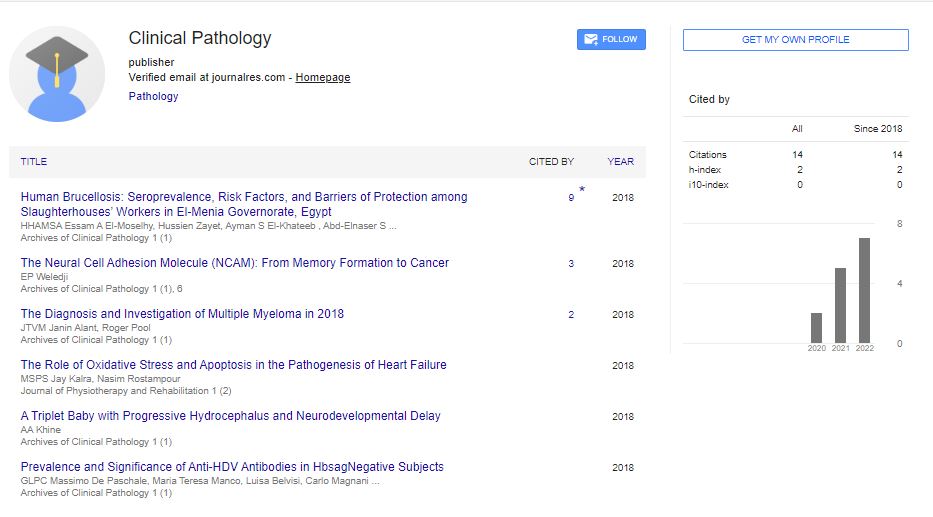Opinion Article, Arch Clin Pathol Vol: 6 Issue: 4
Navigating Transfusion Medicine: Advancements and Applications
Andrew Wilson*
1Department of Pharmacy, University of Pittsburgh Medical Center, Pittsburg, United States of America
*Corresponding Author: Andrew Wilson,
Department of Pharmacy, University of
Pittsburgh Medical Center, Pittsburg, United States of America
E-mail: andrewwilson@uni.edu
Received date: 27 November, 2023, Manuscript No. ACPY-24-124240;
Editor assigned date: 30 November, 2023, PreQC No. ACPY-24-124240 (PQ);
Reviewed date: 13 December, 2023, QC No. ACPY-24-124240;
Revised date: 21 December, 2023, Manuscript No. ACPY-24-124240 (R);
Published date: 28 December, 2023 DOI: 10.4172/acpy.100104
Citation: Wilson A (2023) Navigating Transfusion Medicine: Advancements and Applications. Arch Clin Pathol 6:4.
Description
Transfusion medicine is a specialized field at the intersection of hematology, immunology, and laboratory medicine, dedicated to the safe and effective use of blood and blood products for therapeutic purposes. It encompasses the collection, processing, testing, storage, and transfusion of blood components to address a wide range of medical conditions.
Fundamentals of transfusion medicine
Transfusion medicine primarily focuses on ensuring a safe and adequate supply of blood components, including Red Blood Cells (RBCs), platelets, plasma, and other specialized products, such as cryoprecipitate and granulocytes. Blood donation and processing techniques adhere to strict quality control measures to minimize the risk of transfusion-transmitted infections and adverse reactions.
Compatibility testing, including ABO and Rh blood group typing, along with crossmatching, ensures compatibility between donor blood and recipient to prevent transfusion reactions. Specialized blood products, such as leukoreduced or irradiated components, are prepared to meet specific patient needs and reduce transfusion-related complications.
Clinical applications and role in patient care
Transfusion medicine plays a critical role in various medical scenarios, including surgeries, trauma management, oncology, obstetrics, and hematology. Red blood cell transfusions are crucial for managing anemia due to acute blood loss, chronic conditions, or during surgical procedures to restore oxygen-carrying capacity.
Platelet transfusions are essential for patients with thrombocytopenia or platelet function disorders, particularly in individuals undergoing chemotherapy, bone marrow transplantation, or those with bleeding disorders. Plasma products, such as Fresh Frozen Plasma (FFP) or specific coagulation factor concentrates, are used to manage coagulation factor deficiencies or liver diseaseassociated coagulopathies.
Emerging trends and innovations
Advancements in transfusion medicine continue to refine blood product safety, compatibility, and therapeutic applications. Pathogen reduction technologies employ methods to inactivate pathogens present in blood components, enhancing blood safety by reducing the risk of transfusion-transmitted infections.
The development of recombinant blood products, such as recombinant factor concentrates for hemophilia treatment, offers alternatives to traditional plasma-derived products, minimizing the risk of viral contamination and alloimmunization. Additionally, the utilization of point-of-care testing for blood typing and compatibility assessment streamlines transfusion practices, especially in emergency settings.
Challenges and future directions
Transfusion medicine faces challenges related to maintaining an adequate and diverse blood supply, ensuring blood product safety, and minimizing adverse transfusion reactions. Managing rare blood types and providing sufficient blood products for specific patient populations, such as those with sickle cell disease or thalassemia, remains a challenge.
The future of transfusion medicine involves leveraging advancements in technology and molecular biology to develop personalized blood products, reduce alloimmunization risks, and address challenges in blood inventory management. Innovations in artificial blood substitutes, gene therapy for hemoglobinopathies, and 3D printing for creating artificial organs or tissues may transform transfusion practices.
Conclusion
Transfusion medicine serves as a cornerstone in the modern healthcare, providing life-saving blood products and ensuring their safe and the appropriate use. Its multifaceted applications, from critical care interventions to chronic disease management, significantly impact patient outcomes. With ongoing advancements, innovations, and a focus on patient-centric approaches, transfusion medicine continues to evolve, promising improved therapies and enhanced safety measures in the dynamic landscape of healthcare delivery.
 Spanish
Spanish  Chinese
Chinese  Russian
Russian  German
German  French
French  Japanese
Japanese  Portuguese
Portuguese  Hindi
Hindi 